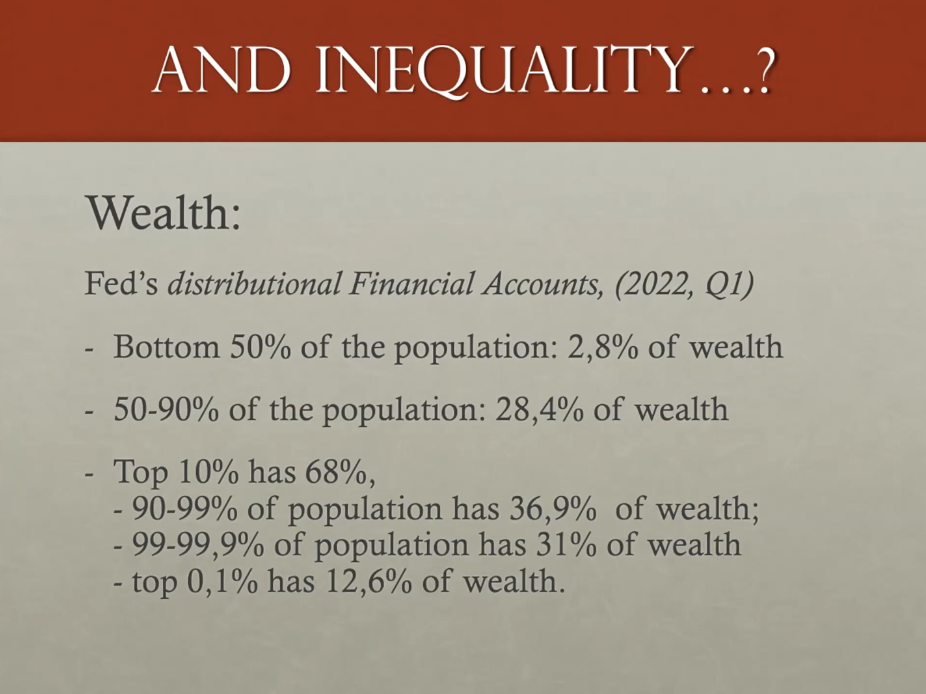Limiting the Hoarding of Wealth for the Benefit of the Environment
On October 18th, 2022, Dr. Ingrid Robeyns brought us the talk, "In this world on fire, what can limitarianism bring us?" This talk provided context about limitarianism as well as arguments for its implementation. The central focus was on the ways that limiting the amount of income and wealth people can accumulate can aid us in addressing the climate crisis that is impacting the whole world.
She begins by defining limitarianism as "the view that there should be an upper limit to how much of a scarce and valuable resource each person can have." This idea could apply to many limited resources, such as land, but in her argument, Dr. Robeyns focuses on economic limitarianism. This can be boiled down to the idea that no one person should be extremely rich.
This talk attempts to combat the affective arguments that limitarianism is based on envy by providing logic and sound assertions on practical ways limitarianism can benefit the planet. She points out that Forbes's list of billionaires includes around 2,000 people, yet this excludes royals and heads of state. In order to become superrich, many leaders exploit the economic resources and people of their countries in order to accumulate personal riches and consolidate their political power.
Over the past forty years, issues surrounding inequality, wealth, and income have been exacerbated. Currently, CEOs make 275 times as much in annual salary as the average worker. Income inequality has been on the rise since the 1980s. Wealth inequality has also increased, with the top 10% holding 68% of the wealth and the top 0.1% alone holding over 12% of the wealth.
Additionally, due to changes in taxation, currently, the effective tax rate is approximately equal for everyone. Poorer people have seen their effective tax rate increase, while the wealthy have seen steady declines in their effective tax rate over decades.
Numbers alone are not the entire argument. Dr. Robeyns also explains that we should care about this massive inequality for several reasons. Firstly, large fortunes are built on deeply immoral practices. Generational wealth has been accumulated through practices like slavery or the advantages won by certain groups under the Nazi regime. Additionally, wealth is distributed in a racially unequal way. Enslavers were the ones financially compensated when slavery ended. Racist practices have continued to prevent black and non-white people from accessing the same opportunities for wealth and income generation as white people.
Dr. Robeyns also points out that excess wealth is almost always due to luck and circumstance rather than individual effort. Hard work alone cannot lead people to make billions of dollars. Additionally, factors like where and when one is born, family, education, and access are extremely influential on wealth yet are out of people's control. Through this, we can see how no one ethically "deserves" a billion dollars.
Extreme wealth accumulation is wasteful, as a more even distribution could solve many urgent issues. Wealth concentration also undermines democratic values. Through campaign contributions and lobbying, the wealthy have an oversized impact on election outcomes and more political power than anyone else. Finally, Dr. Robeyns argues that extreme wealth is incompatible with ecological sustainability.
A lot of wealth is based on ecological destruction. Additionally, in many cases, such as for the fossil fuel industry, their fortunes would be much smaller if they had met ecological duties and standards. On top of this, the fossil fuel industry also uses its wealth to actively obstruct climate action through lobbying and other financial means. By taxing extreme wealth, we could limit the impact of the super rich on climate change policy. Extremely wealthy people are incentivized to limit climate change control as they live hyper-polluting lifestyles with huge yachts and private jets. Rich people emit significantly more, and rich countries contribute a larger proportion of pollution as well.
We are facing a collective emergency. It will not be solved by waiting for rich individuals to find a solution. They have the wealth but not the expertise or incentive to take dramatic action. The money to address our problems exists, and governments would be better positioned to use it for collective climate change actions, as they have more influence and power in the lives of individuals and on a global scale. Despite this, Dr. Robeyns promotes limitarianism rather than egalitarianism because limitarianism still allows for an acceptable range of inequality and doesn't require a complete overhaul of social, political, and economic values.
About the Author
Stella Hudson is a Graduate Assistant with the Baha’i Chair for World Peace. She graduated from the College of William and Mary in 2021 with a B.A. in English. She will graduate from the University of Maryland with her MLIS in spring 2023.



